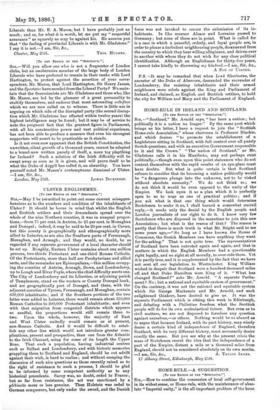ULSTER ENGLISHMEN.
[To THE EDITOR OF THE "SPECTATOR.'] SIN,—May I be permitted to point out some current misappre- hensions as to the numbers and condition of the inhabitants of Ulster ? It should be borne in mind that whilst the English and Scottish settlers and their descendants spread over the whole of the nine Northern counties, it was in unequal propor- tions,—from 75 per cent. in Antrim, to 25 per cent. in Monaghan and Donegal ; indeed, it may be said to be 20 per cent. in Cavan, but this county is geographically and ethnographically more allied to Leinster, as are also the Southern parts of Fermanagh, Monaghan, and Armagh ; and they would, no doubt, be so regarded if any separate government of a local character should be set up. Roughly, Eastern Ulster contains about one million persons, two-thirds Protestant and one-third Roman Catholic. Of the Protestants, more than half are Presbyterians and allied sects, and the remainder are Episcopalians,—this million occupy- ing the counties of Antrim, Armagh, Down, and Londonderry, up to Lough and River Foyle, where the chief difficulty meets one. The City of Londonderry and its Liberties, or adjoining parish of Templemore, stand on the western or County Donegal bank, and are geographically part of Donegal, and these, with the adjacent counties of Tyrone, Fermanagh, and Monaghan, contain 630,000 inhabitants ; and if the Southern portions of the two latter were added to Leinster, there would remain about 350,000 Roman Catholics to 200,000 Protestant inhabitants ; and even with that migration from congested districts which appears so needful, the proportions would still remain three to two. Upon the whole, however, the majority of East and West Ulster unitedly would remain as at present, non-Roman Catholic. And it would be difficult to estab- lish any other line which would not introduce greater com- plications, present and prospective, than one from the Atlantic to the Irish Channel, using for some of its length the Upper Erne. That such a population, having industrial centres such as Belfast and Londonderry, and with historic memories grappling them to Scotland and England, should be cut adrift against their wish, is hard to realise ; and without essaying the discussion of such nice questions as those recently raised as to the right of resistance to such a process, I should be glad to be informed by some competent authority as to any historical precedents. Savoy was, no doubt, ceded to France ; but so far from resistance, the act was sanctioned by a plibiscite more or less genuine. Then Holstein was ceded to German conquerors, but only under the sword, and the Danish
force was not invoked to secure the submission of its in- habitants. In like manner Alsace and Lorraine passed to Germany ; but none of these are in point. What is called for is a case in which a peaceful, orderly, and loyal people are, in order to please a turbulent neighbouring people, disannexed from the country to which they bear willing allegiance, and driven over to another with whom they do not wish for any close political identification. Although an Englishman for thirty-five years, I cannot take kindly to disowning my kindred.—I am, Sir, dro., A SON OF ULSTER..
P.S. —It may be remarked that when Lord Sherborne, the ancestor of the Duke of Abercorn, demanded the surrender of Londonderry, the resisting inhabitants and their armed neighbours were rebels against the King and Parliament of Ireland, and claimed, as English and Scottish settlers, to hold the city for William and Mary and the Parliament of England.


































 Previous page
Previous page